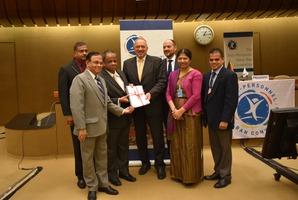
Sri Lanka presented the initial report under the Anti-Personnel Mine Ban Convention (Ottawa Convention) today, 29th November 2018 at Palais des Nations, Geneva.
Mr. Peter Kolarov, Senior Officer of the United Nations Office for Disarmament Affairs (UNODA) in Geneva received the country report from Secretary to the Ministry of Resettlement, Rehabilitation, Northern Development and Hindu Religious Affairs, Mr. V. Sivagnanasothy on the sidelines of the 17th Meeting of the States Parties (17MSP) to the Ottawa Convention currently underway from 26-30 November 2018.
The report had been prepared by the Ministry of Resettlement, Rehabilitation, Northern Development and Hindu Religious Affairs in collaboration with the Ministries of Foreign Affairs and Defence and other key stakeholders. The report outlines the progress made in mine action in Sri Lanka, acknowledging the assistance and support provided by international and national stakeholders as well as the work that is continuing to make Sri Lanka mine-free by 2020, and further support required to realise targets set.
Ambassador A.L.A. Azeez, Permanent Representative of Sri Lanka to the UN in Geneva, Mrs. Samantha Jayasuriya, Deputy Permanent Representative, Ms. Shashika Somaratne, Minister Counsellor, and Mr. Asanka Neel Fernando, Director, Planning of the Ministry of Resettlement, Rehabilitation, Northern Development and Hindi Religious Affairs were associated with Mr. Sivagnanasothy on the occasion.
Permanent Mission of Sri Lanka
Geneva
29 November 2018
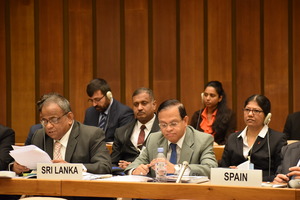
"“Making Sri Lanka a mine free country by 2020 remains our goal and vision", remarked the leader of the Delegation of Sri Lanka to the 17th Meeting of State Parties (17 MSP) to the Anti-Personnel Mine Ban Convention (Ottawa Convention) Mr. V. Sivagnanasothy, addressing the State Parties' Meeting in Geneva on 26 November 2018. He stressed that the ongoing mine action in Sri Lanka complemented the national drive towards strengthening harmony and co-existence, thereby contributing to the achievement of Sustainable Development Goals (SDGs) and economic and social prosperity.
Highlighting the different aspects of mine action progamme implemented by the Ministry of Resettlement, Rehabilitation, Northern Development & Hindu Religious Affairs, Mr. V. Sivagnanasothy, in his capacity as the Secretary to that Ministry, elaborated the 5-Year Strategic Plan (2016-2020) developed in consultation with the National Mine Action Centre and other stakeholders as well as measures taken to fulfil the commitments under the Ottawa Convention.
He also underlined Sri Lanka's commitment and dedicated efforts which led to remarkable achievements in the demining process. His progress update identified the District of Batticaloa as having been declared as a mine-free District in 2017, while contaminated areas in Sri Lanka had been reduced to 26 Sq.km in 2018. It also included an outline of comprehensive measures taken by Sri Lanka to destroy the stockpiles within the next 3 years as well as mine risk education being conducted in Northern and Eastern Provinces.
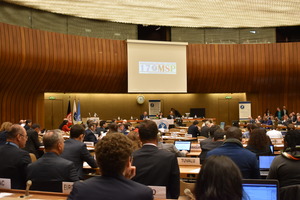
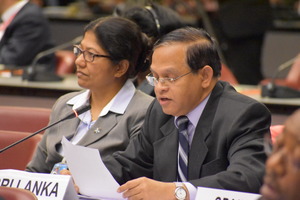
“The Global Compact for Migration (GCM)” due to be endorsed at a high level international conference in Marrakesh in December this year, Ambassador A.L.A. Azeez, Sri Lanka Permanent Representative in Geneva said “is not the end –but the beginning of the real work”. He made this remark, addressing the General Debate of the ongoing 109th Session of the IOM Council in Geneva. He urged all countries, ‘especially those which have for decades valued and sustained migration as a source of national economic advancement,’ to unreservedly endorse the GCM’, as ‘it has now left us with an integrated framework for action.’
Assuring that Sri Lanka, in its national capacity, and both as the Chair of the Abu Dhabi Dialogue (ADD) and the founder member of the Colombo Process (CP) - would endeavour in the best possible way to take the GCM processes forward, he emphasized the importance of the implementation of the Global Compact by all stakeholders. He further said that Sri Lanka looked forward to contributing actively to the discussion on the modalities for follow-up and review of progress in the Global Compact early next year. The GCM, Ambassador Azeez noted, was rooted in achieving SDG’s, adding that it was important to look at how effectively implementation of commitments could take place taking into account the respective regional dynamics and priorities.
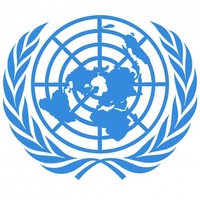
"Sri Lanka attaches great importance to the CCW, as one of the key instruments advancing humanitarian disarmament, addressing the concerns on maintaining the balance on military necessity and mitigating humanitarian concerns arising from the use of certain conventional weapons or weapons systems".
Minister Counsellor of the Permanent Mission of Sri Lanka Ms. Shashika Somaratne remarked while delivering Sri Lanka's Statement during the general exchange of views at the Meeting of High Contracting Parties of the Convention on Prohibitions or Restrictions on the Use of Certain Conventional Weapons Which May be Deemed to Be Excessively Injurious or to Have Indiscriminate Effects (CCW), on 21 November 2018 at Palais des Nations in Geneva.
Highlighting Sri Lanka's experience on the consequences of the use of landmines, it was noted Sri Lanka is on a firm path towards becoming landmine free by 2020, with the active support of stakeholders. While observing that Sri Lanka has made "considerable headway in determining the extent of contaminated area" as well as the mine risk education programme involving the affected community resulting in a drastic reduction of mine related casualty, Sri Lanka indicated that it will be in a position to share its experience in relation to mine action endeavours with interested parties.
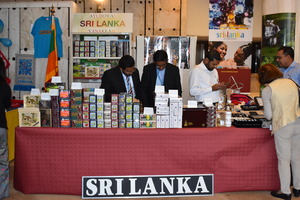
World renowned Ceylon Tea along with Ceylon Cinnamon based products and Sri Lanka's famed precious stones attracted a large number of visitors to the National Stall set by the Permanent Mission of Sri Lanka in Geneva at the United Nations Women’s Guild Bazaar on Tuesday, 20 November 2018. The Sri Lankan Food Stall run by the family members of the Mission's staff was a hot attraction providing the visitors opportunity to taste the famous Sri Lankan rice and curry.
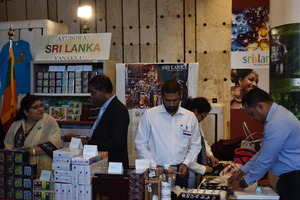
Organized by the United Nations Women’s Guild and Permanent Missions accredited to the United Nations in Geneva, over the years the UNWG Bazaar has become a premier event in the UN calendar, with more than 150 countries' national stalls attracting close upon 6,000 visitors from all over Switzerland and neighboring cities. In addition to promoting and displaying cultural diversity of the membership of the United Nations, thus bringing them all on a unifying platform, the event provides a unique opportunity each year, for the visitors to buy handmade products and souvenirs from different countries and to experiment cuisines from around the world.
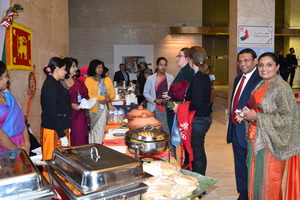
Proceeds from the Permanent Mission’s National Stall are donated to the UN Women’s Guild which supports charity projects for disadvantaged children around the world annually.
Permanent Mission of Sri Lanka
Geneva
21 November 2018

World renowned Ceylon Tea along with Ceylon Cinnamon based products and Sri Lanka's famed precious stones attracted a large number of visitors to the National Stall set by the Permanent Mission of Sri Lanka in Geneva at the United Nations Women’s Guild Bazaar on Tuesday, 20 November 2018. The Sri Lankan Food Stall run by the family members of the Mission's staff was a hot attraction providing the visitors opportunity to taste the famous Sri Lankan rice and curry.

Organized by the United Nations Women’s Guild and Permanent Missions accredited to the United Nations in Geneva, over the years the UNWG Bazaar has become a premier event in the UN calendar, with more than 150 countries' national stalls attracting close upon 6,000 visitors from all over Switzerland and neighboring cities. In addition to promoting and displaying cultural diversity of the membership of the United Nations, thus bringing them all on a unifying platform, the event provides a unique opportunity each year, for the visitors to buy handmade products and souvenirs from different countries and to experiment cuisines from around the world.

Proceeds from the Permanent Mission’s National Stall are donated to the UN Women’s Guild which supports charity projects for disadvantaged children around the world annually.
Permanent Mission of Sri Lanka
Geneva
21 November 2018

World renowned Ceylon Tea along with Ceylon Cinnamon based products and Sri Lanka's famed precious stones attracted a large number of visitors to the National Stall set by the Permanent Mission of Sri Lanka in Geneva at the United Nations Women’s Guild Bazaar on Tuesday, 20 November 2018. The Sri Lankan Food Stall run by the family members of the Mission's staff was a hot attraction providing the visitors opportunity to taste the famous Sri Lankan rice and curry.

Organized by the United Nations Women’s Guild and Permanent Missions accredited to the United Nations in Geneva, over the years the UNWG Bazaar has become a premier event in the UN calendar, with more than 150 countries' national stalls attracting close upon 6,000 visitors from all over Switzerland and neighboring cities. In addition to promoting and displaying cultural diversity of the membership of the United Nations, thus bringing them all on a unifying platform, the event provides a unique opportunity each year, for the visitors to buy handmade products and souvenirs from different countries and to experiment cuisines from around the world.

Proceeds from the Permanent Mission’s National Stall are donated to the UN Women’s Guild which supports charity projects for disadvantaged children around the world annually.
Permanent Mission of Sri Lanka
Geneva
21 November 2018
